- About Us
- Columns
- Letters
- Cartoons
- The Udder Limits
- Archives
- Ezy Reading Archive
- 2024 Cud Archives
- 2023 Cud Archives
- 2022 Cud Archives
- 2021 Cud Archives
- 2020 Cud Archives
- 2015-2019
- 2010-2014
- 2004-2009
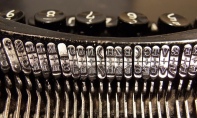 |
Cud Flashes In The Pan |
When the Constitution Failed
Just one story this month. How bulletproof is the Constitution? Maybe only as bulletproof as we let it be. Given its abuse at the hands of Donald Trump and the Republican Party, it might be far more fragile than we think. Who else might seek to trample on it in the coming centuries? And what might future generations think when they look back on the challenges that our Republic has faced?
“When the Constitution Failed”
Social science fiction
By David M. Fitzpatrick
It was the 4 July 2276, the five hundredth birthday of the United States of America. There was a massive celebration all year long in New Washington, and Jayna and her wives, Kaleetha and Zira, were lucky enough to attend on a vacation week. The three women spent several days taking in myriad museums and learning things about American history that they hadn’t known.
Two days before they had to return home, they were debating what to see. There was so much, but they couldn’t possibly cover everything.
“How about the Hall of the One Hundred Forty-Nine States?” Kaleetha said. She was a tall, beautiful woman with short black hair, olive skin, and piercing dark eyes. Jayna could see the visual displays lighting up inside Kaleetha’s eyes as she scrolled through the options.
They were walking on the American Mall, a sprawling, three-thousand-acre stretch of greenery lined by short buildings that all went deep underground, housing museums galore. Jayna and Zira called up lists on their own ocular displays.
“There’s the Museum of the Four World Wars,” Jayna said. “Sounds quite depressing, though. That’s a lot of barbaric behavior not all that long ago in our history.”
“There’s an interactive tour of the Ninety-Two Amendments at the Constitutional Museum, with a highlight on the incorporation of the New Bill of Rights in 2105,” Zira said. The ebony-skinned woman had cascading curls of green hair that tumbled about her shoulders and down to her waist. “That sounds positive. The New Bill of Rights finally ended religious control of the country, and many others things.”
Then Jayna saw one that caught her bright blue eyes. “How about the Museum of Presidents? It features information on all one hundred thirty-three presidents.”
Kaleetha and Zira’s faces brightened. “That sounds good!” Kaleetha said, and Zira agreed.
They kicked in their hovershoes and zipped quickly down the Mall to the museum. Soon they were inside, walking the long halls that stretched back through the building. They began with George Washington and followed through history. It took a while, and they saw them all. When they were finally leaving, Zira said, “Am I wrong, or did we only see one hundred thirty-two? I think they forgot one.”
They were passing through the central court in the long building, where a holosign advertised “When the Constitution Failed.”
“What’s that mean?” Kaleetha said.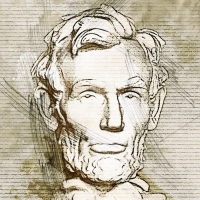
Zira shrugged. “I don’t know. But it sounds interesting. Let’s find out.”
The trio entered the holochamber, where other patrons were awaiting the show to begin. They found good spots and waited for the room to darken. Images appeared as the room lit up, and holograms of presidents appeared amongst them until the room was crowded with them. Show-goers oohed and aahed as President Abraham Lincoln doffed his stovepipe hat at them, President John F. Kennedy talked about going to the Moon, President Barack Obama introduced himself as the first of many Black presidents, and President Lara Kang talked about the challenges of leading the nation through World War III. The holograms seemed lifelike as they interacted with the live patrons, carrying on intelligent conversations.
“This is wild!” Jayna said.
“Not as wild as hunting bears,” President Teddy Roosevelt said to her. “Your beauty reminds of my first wife, Alice—but she never had blue hair.”
Jayna laughed at the smiling man wearing old-style glasses. “I like blue. It reminds me of the sky. And it matches my eyes.” She had long, straight hair, although not as long as Zira’s; streaks of bright blue alternated with her natural blond color.
“You and those bears,” said President Thomas Jefferson as he joined them.
“Pay these manly men no mind,” said a stately woman with brown hair neatly piled atop her head, stepping up with a broad smile. She wore a black skirt and red jacket.
Jayna sucked in her breath. “Oh, my… President Elizabeth Jennings-Griffin. The first gay woman elected president.”
“By a landslide,” Jennings-Griffin said. “And with a transgender wife, no less—a challenge even in my time.”
The women chatted with the three dead presidents for a few minutes before the lights dimmed again and a voice boomed over the speakers.
“There have been one hundred thirty-three presidents of the United States of America,” the voice said, as the holographic presidents all turned their attention to the front of the auditorium. “All pledged to uphold and defend the Constitution. Some have been better about it than others. At this time, I’d like to have all the presidents come up to the stage.”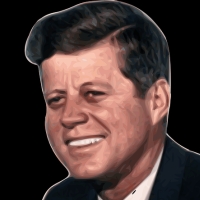
The holographic presidents moved forward, even as a holographic stage with a series of steps blinked into existence. The patrons watched with whispered excitement as the presidents moved through the crowd, mounted the stairs, and took their places on the stepped levels until they were all displayed like ranks of old-time soldiers. They were male and female of all different colors, and with five centuries of very different clothing. Soon, they stood at attention, posing as they had in their official portraits.
“The Constitution is nothing but a set of rules,” said the announcer. “Like a game we play, we agree to those rules. Presidents follow them, most of the time. But one presidency began the failure of the Constitution, during a time when Americans wondered whether the Republic might collapse.”
Suddenly, one of the presidents glowed extremely brightly—and flashed out of existence, replaced by the holographic three-dimensional number of the president, which floated upwards as it faded away. The crowd let out a collective gasp, even as presidents on the steps began to glow and vanish in flashes of light.
“This president dared to upend the political establishment of the time, and not for positive reasons,” the voice said. “Others followed his lead, but fortunately we closed many loopholes in the Constitution in time—to prevent it from being destroyed, and prevent the fall of the United States of America.”
Presidents were flashing away more rapidly now, numbers rising and fading away. Jayna, Zira, and Kaleetha held their breaths as they watched.
“This man abused the rule of law at every level, with no regard to the importance of the Constitution…”
Flashing, flashing... fading numbers… they were vanishing fast.
“...and his political party—back in a time when people belonged to them, and all of our government was composed of such stark political division—protected him no matter what he did, no matter the damage he tried to inflict…”
The last few flashed out of existence, and there on the platform stood the last remaining figure: George Washington, the first president. The room was filled with gasps of surprise and wonder. Then Washington began to grow; the stepped stage vanished, but Washington didn’t fall, instead growing until his feet reached the floor and his head the ceiling. He stood, towering above the room, twenty feet tall. And when he spoke, everyone could hear that he was the narrator that they had been listening to.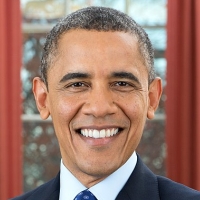
“You didn’t think it was me, did you?” he said with a smile. “I didn’t even believe in political parties.”
He glowed brighter than any president had, and when he vanished in a burst of light, he had been replaced by a haggard, obese man with disproportionately small hands, and with orange hair and skin to match. He regarded them with a scowl above his turkey neck.
“Donald J. Trump, the forty-fifth president of the United States,” came Washington’s disembodied voice. “Presidential historians have consistently rated him near the very bottom of the list of presidents since he left office. By fifty years after his death, historians consistently rated him dead last—even lower than President Jarrod Templeton, who died barely three days into his presidency from a brain aneurysm. Templeton wasn’t a bad president; he just wasn’t around long enough to accomplish anything.
“But Donald Trump had ample opportunity to accomplish things—yet he accomplished very little, save for things that those in our time observe with almost universal shock, distaste, and disgust. This is why there was no display in the Museum of Presidents; he did so much that was bad that we’ve created a holofilm that outlines his presidency, from his life before to his campaigning to his occupation of the White House—and his tremendous assault on the Constitution and our Republic that the nation somehow endured.”
“It can’t be that bad,” Kaleetha said. “No one could be that bad.”
“Someone has to be at the bottom of the list,” Zira replied. “I say we stick around and watch.”
The lights dimmed again, and the three women gripped each other’s hands tightly. Jayna felt very anxious; fleetingly, she was glad that she was between her two wives, so that both her hands were safely held as the holofilm began to play out before them.
* * *
It was dark outside when Jayna, Zira, and Kaleetha exited the museum. They walked in stunned silence across the mall, not even activating their hovershoes. Jayna was still in the middle, squeezing her wives’ hands tightly.
It was several minutes before Kaleetha finally spoke. Jayna was used to Kaleetha talking all the time, so that was notable.
“That was extraordinary,” Kaleetha said. “We heard about Trump occasionally in school, but I… never thought he was that bad.”
“Or that so many people who voted for him were that bad,” Zira said.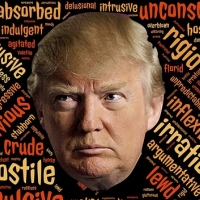
“Or that his political party was that bad,” Kaleetha said. “At least his bad presidency was the beginning of constitutional reforms that made us better.”
Zira scoffed. “From what we just learned, I bet if Trump were here today, he’d take credit for all that. I can hear him now: ‘What I did was yuuuge, people. I was the best at being a bad president, believe me, and without me doing everything wrong, the country wouldn’t have gotten better. You’re all lucky I was such a stable genius.’”
Jayna reined up on the grass under the stars, forcing Kaleetha and Zira to stop and turn to her in surprise.
“You’re crying,” Kaleetha said, incredulous.
A tear was running down Jayna’s cheek, and she wiped it away with her sleeve, nodding. “There was so much bad stuff in American history,” she said. “Slavery, war, and hate. Racism, misogyny, and homophobia. Poverty and classism and plutocracy. And capitalism that enabled and strengthened every one of those terrible things. We heard about the highlights in history class, but… it seems so much more real now. This guy… Trump wasn’t just a bad president. He was a bad person. Greedy, dishonest, selfish, hateful, unstable, delusional, stupid… the man was just evil, no matter how you looked at him.”
“I can’t imagine how people lived through that,” Zira said, stepping forward and taking her wife into her arms. “I’m glad we didn’t have to. And I’m sorry for all those who did.”
Kaleetha joined them, and they embraced together for a long minute. Jayna finally pulled away, and the three women held each other’s forearms and looked at each other with sorrow in their eyes.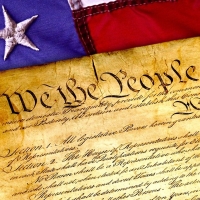
“I’ll never think about our country the same way again,” Jayna said. “I’ll never take the freedoms that we all have for granted. And I’ll always think about the people who came before us… those who suffered and died, who lived oppressed and without equal rights—those who actually lived in such barbaric and primitive times. I’ll never forget what we overcame as a society to enable what we’ve accomplished in every way.”
“I wonder if they thought about us,” Kaleetha mused. “I wonder if, back in Trump’s time, there were those who hoped for a future where people like us would look back at what happened before and appreciate what they went through to preserve the Republic.”
Jayna looked up at the stars, and Kaleetha followed her gaze.
The Moon was full in the night sky. It was a beautiful blue-green, with swirls of clouds and sparkling oceans.
“It looks so peaceful,” Zira said. “Sometimes it’s hard to believe that so many people live there—and that there are seven States there, and twenty-six on our home world of Venus.”
“But it all started here, on Earth,” Kaleetha said. “It’s always exciting to be in the place that the United States of America began.”
“America isn’t a place,” Jayna said. “It’s an idea.”
They held each other and looked at Earth, eager and hopeful for the future.
David M. Fitzpatrick is a fiction writer in Maine, USA. His many short stories have appeared in print magazines and anthologies around the world. He writes for a newspaper, writes fiction, edits anthologies, and teaches creative writing. Visit him at www.fitz42.net/writer to learn more.
